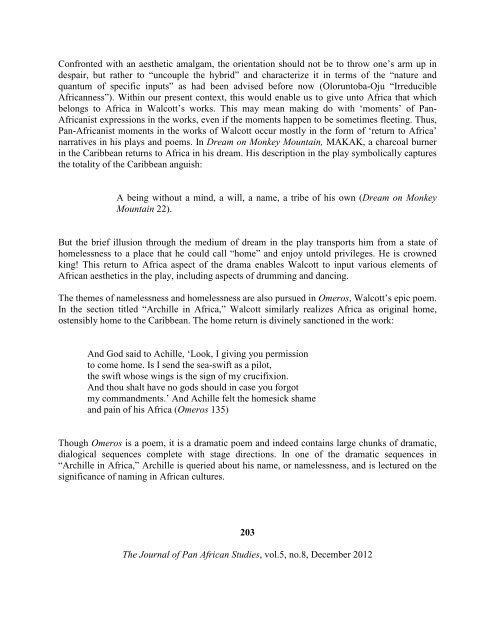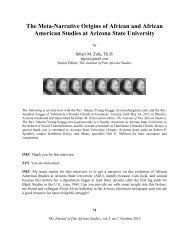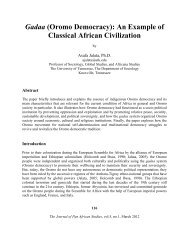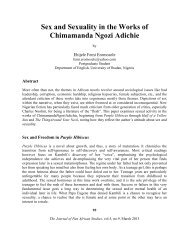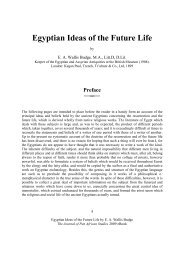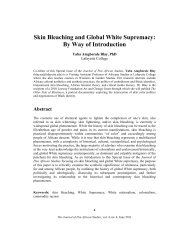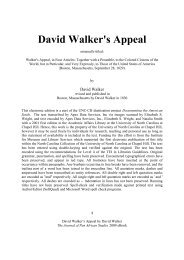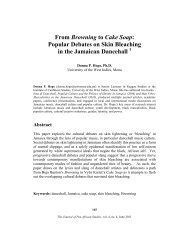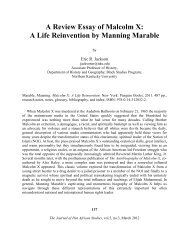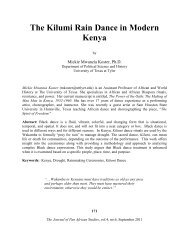view PDF - Journal of Pan African Studies
view PDF - Journal of Pan African Studies
view PDF - Journal of Pan African Studies
You also want an ePaper? Increase the reach of your titles
YUMPU automatically turns print PDFs into web optimized ePapers that Google loves.
Confronted with an aesthetic amalgam, the orientation should not be to throw one’s arm up in<br />
despair, but rather to “uncouple the hybrid” and characterize it in terms <strong>of</strong> the “nature and<br />
quantum <strong>of</strong> specific inputs” as had been advised before now (Oloruntoba-Oju “Irreducible<br />
<strong>African</strong>ness”). Within our present context, this would enable us to give unto Africa that which<br />
belongs to Africa in Walcott’s works. This may mean making do with ‘moments’ <strong>of</strong> <strong>Pan</strong>-<br />
<strong>African</strong>ist expressions in the works, even if the moments happen to be sometimes fleeting. Thus,<br />
<strong>Pan</strong>-<strong>African</strong>ist moments in the works <strong>of</strong> Walcott occur mostly in the form <strong>of</strong> ‘return to Africa’<br />
narratives in his plays and poems. In Dream on Monkey Mountain, MAKAK, a charcoal burner<br />
in the Caribbean returns to Africa in his dream. His description in the play symbolically captures<br />
the totality <strong>of</strong> the Caribbean anguish:<br />
A being without a mind, a will, a name, a tribe <strong>of</strong> his own (Dream on Monkey<br />
Mountain 22).<br />
But the brief illusion through the medium <strong>of</strong> dream in the play transports him from a state <strong>of</strong><br />
homelessness to a place that he could call “home” and enjoy untold privileges. He is crowned<br />
king! This return to Africa aspect <strong>of</strong> the drama enables Walcott to input various elements <strong>of</strong><br />
<strong>African</strong> aesthetics in the play, including aspects <strong>of</strong> drumming and dancing.<br />
The themes <strong>of</strong> namelessness and homelessness are also pursued in Omeros, Walcott’s epic poem.<br />
In the section titled “Archille in Africa,” Walcott similarly realizes Africa as original home,<br />
ostensibly home to the Caribbean. The home return is divinely sanctioned in the work:<br />
And God said to Achille, ‘Look, I giving you permission<br />
to come home. Is I send the sea-swift as a pilot,<br />
the swift whose wings is the sign <strong>of</strong> my crucifixion.<br />
And thou shalt have no gods should in case you forgot<br />
my commandments.’ And Achille felt the homesick shame<br />
and pain <strong>of</strong> his Africa (Omeros 135)<br />
Though Omeros is a poem, it is a dramatic poem and indeed contains large chunks <strong>of</strong> dramatic,<br />
dialogical sequences complete with stage directions. In one <strong>of</strong> the dramatic sequences in<br />
“Archille in Africa,” Archille is queried about his name, or namelessness, and is lectured on the<br />
significance <strong>of</strong> naming in <strong>African</strong> cultures.<br />
203<br />
The <strong>Journal</strong> <strong>of</strong> <strong>Pan</strong> <strong>African</strong> <strong>Studies</strong>, vol.5, no.8, December 2012


